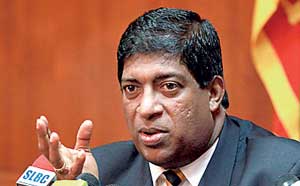Reply To:
Name - Reply Comment
By Chandeepa Wettasinghe
Finance Minister Ravi Karunanayake said that banks and non-banking financial institutions which charge excessive penal rates will be subjected to more taxes if the rates are not moderated soon, categorizing such revenue as ill-gotten gains.
“Certainly, these are matt ers that are being exploited. Billions have been made in penal rates. Please look into it, otherwise the government will take profits from those penal rates, because those are unfavourable,” Ravi Karunanayake said at the 3rd Ease of Doing Business Forum last week.
ers that are being exploited. Billions have been made in penal rates. Please look into it, otherwise the government will take profits from those penal rates, because those are unfavourable,” Ravi Karunanayake said at the 3rd Ease of Doing Business Forum last week.
He was responding to Electro Metal Pressing (Pvt) Ltd’s Mahinda Marasinghe, who said that overdue payments are being subjected to a penal rate of as high as 48 percent by the banks.
Government officials present said that there were cases where companies who had borrowed Rs.25 million had ended up paying Rs.150 million to financial institutions due to such high penal rates.
Central Bank Governor Arjuna Mahendran said that the regulator has advised all financial institutions to place a cap on their penal rates, but added that it is not being observed.
“We may have to examine under the new administration, whether we should make this a law, because banks are exploiting that loophole and there’s no strong legal validity for them to follow it seriously,” he said.
Meanwhile, Mahendran asked victims of high penal rates to be in touch with the regulator.
“The Central Bank will help customers to deal with these banks,” he said.
Karunanayake expressed that businesses would not encounter this problem if they deal with state banks.
However, state banks have statutory requirements to invest in government securities, with only a small portion allocated to corporate financing.
Further Marasinghe said that his company couldn’t borrow from state institutions as they ask for securities, instead of evaluating cash flows.
Marasinghe also said that his company could not meet debt installments as the government had not met the payment deadlines Electro Metal Pressing had been involved in.
Karunanayake noted that this was due to delays in ascertaining the morality of certain projects as well as the inherent delays in the state system.
“These are systematic problems, and has a knock-on effect on other businesses,” Mahendran too added.